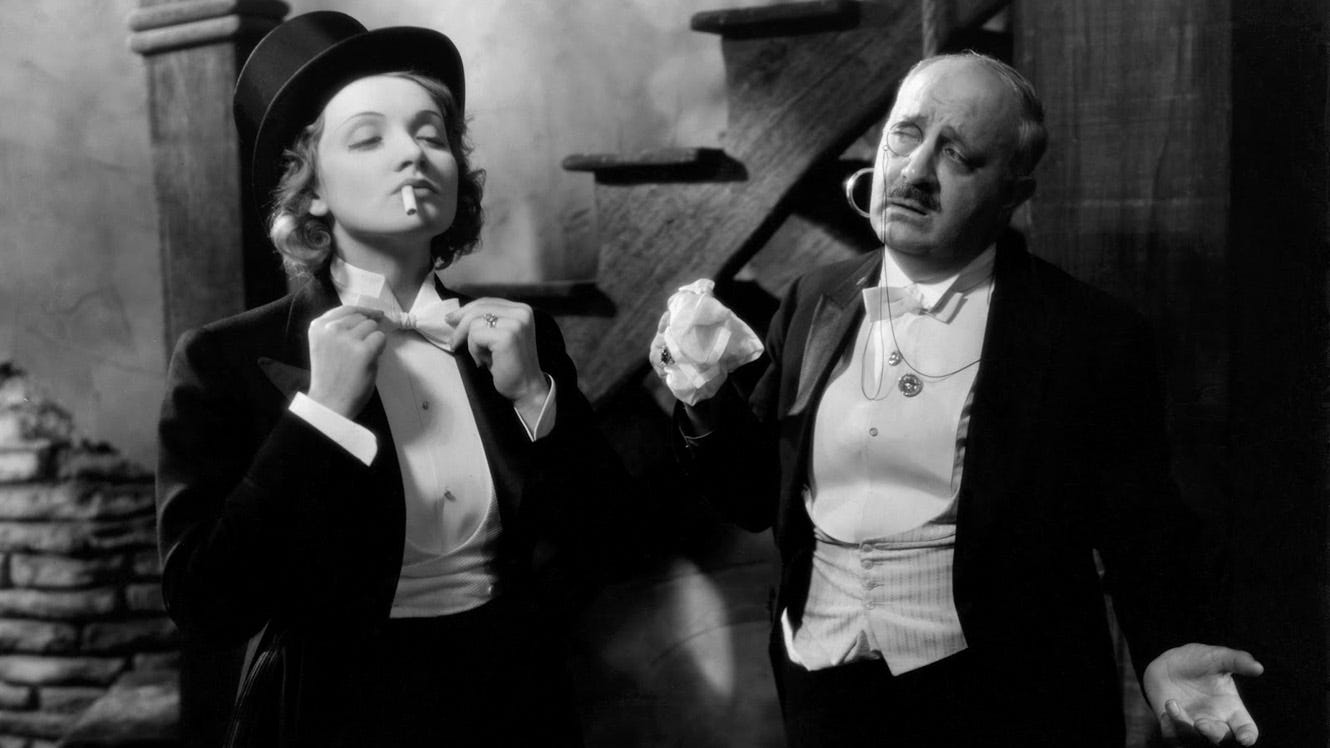the celluloid closet
Documentary, 2003, 3.5 stars
Written and Directed: Robert Epstein and Jeffrey Friedman (From the novel by Vito Russo)
Even many years on, The Celluloid Closet is still a fascinating look at the evolution of homosexuality in mainstream cinema. Though I haven't read the Vito Russo book that inspired the documentary, I’ve been told it is required reading for anyone interested in reading homosexuality in films from the Golden Era of Hollywood. In any case, the book is meant to be twice as thorough as the documentary, and I was blown away enough by the revelations in this film.
Though two-thirds of the film concentrates on the depiction of male homosexuality, I would like to concentrate on those parts of the film concerning lesbians.
For anyone who had any doubt that Lily Tomlin's sexuality was the worst kept secret in Hollywood there are few surprises here, and I've even heard people be quite savage about the fact that a woman who spent the vast majority of her acting career happily closeted should then host a documentary entitled The Celluloid Closet and decry the invisibility of gays and lesbians in Hollywood. Since I believe being in or out is a personal choice I don't care either way, I'm just glad that intelligent, sexy, informed women such as Lily Tomlin, Whoopi Goldberg and Susan Sarandon chose to be a part of this film.
One of the most enlightening moments of the film comes when film critic and writer Susie Bright talks about the frustration lesbians often feel when faced with a film that actively goes out of its way to hide the obvious sexual status of its characters, particularly when those characters come from a book in which their sexuality was explicit. Fried Green Tomatoes at the Whistle Stop Café was the film singled out here, and I'll happily join the ranks of people frustrated as hell that Idgie and Ruth's relationship was hidden. This couple joins the Xena: Warrior Princess school of hidden-yet-blatantly-obvious lesbianism.
It was an example of a Hollywood too concerned with the moral right wing to depict the women the way they deserved to be depicted, as a loving couple willing to sacrifice everything for their relationship. The world is swamped with films that expound the joys and strengths of female friendships, and while I would never try to undermine the importance of those films, I think it is damn well time for the world to admit that sometimes those friendships are a little more. But enough about that.
Another revelation from The Celluloid Closet was Susan Sarandon's commentary about The Hunger and her sex scene with Catherine Deneuve. After assuring us she required no alcohol to jump into bed with her sexy co-star (despite stories published to the contrary), she also reveals her input into making the sex scene something more than just a blatant titillation for men. Her efforts to include female sensuality have no doubt been appreciated by women the world over since the film's release.
Also, remember the kiss in the car at the end of Thelma and Louise? Completely ad libbed by the two actresses, but it wasn't meant to be read as sexual. Sarandon comments, and rightly so I think, that if there is ever a time when a person isn't thinking about hitting on someone it is probably when they are about to kill themselves by driving over a cliff. I think we can all appreciate that sentiment.
These stories and more are told in this film with humour, good grace, and a much respect for those talented writers, actors and filmmakers who defied Hollywood and society in general in their attempts to bring pieces of homosexual life to the screen. It expounds the theory of what has become known in film studies circles as appropriation—how gay audiences take even the smallest references and expand upon them to create a gay reading of an essentially straight film. If gay lifestyles were being hidden, we found them, and if they weren't there, we created them. Anything to see ourselves and our lifestyles portrayed on the screen.
Gay filmmaking abounds for us to enjoy now, but we should never forget the struggles that took place to get us to this point, and the classic films that paved the way. I laughed, I was disgusted, I was shocked and appalled, but most of all I was proud of the obstacles that were overcome to bring our lives to the screen.
Congratulations Vito Russo for the vision and research, and congratulations to all the filmmakers, writers and actors whose work inspired the gay filmmakers of today. Personally I would love to see part two— in what ways has Hollywood changed? What is the role of independent cinema, or streaming? How much pressure is there on Hollywood now to be more representative? Did television take up the slack where film failed?
All these questions strike me as natural extensions to the issues raised in this documentary. And I know I'll never watch Ben Hur in quite the same way ever again.


